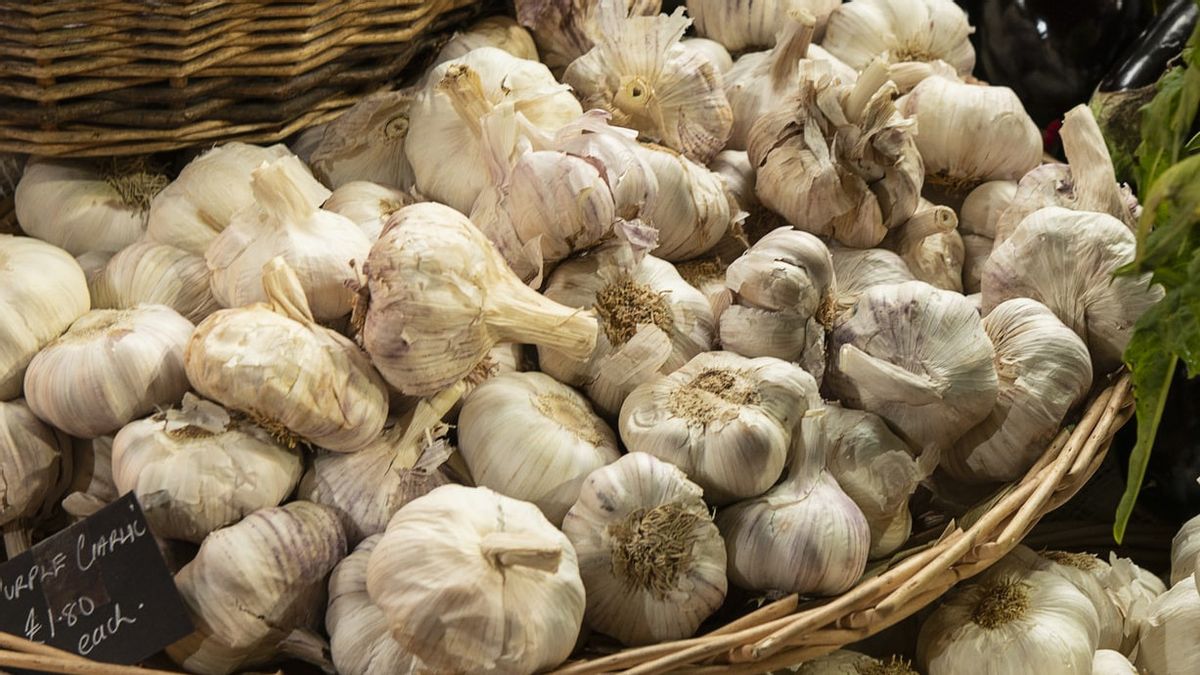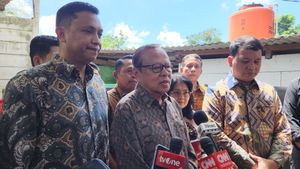JAKARTA - Uncertainty is now occurring in the process of accelerating the process of importing foodstuffs, especially garlic and onions. The reason is that the import permit exemption decided by the Ministry of Trade (Kemendag) is actually denied by the Ministry of Agriculture (Kementan), which insists on imposing Horticultural Product Import Recommendations (RIPH) as a mandatory requirement for importers.
Regarding this stubborn attitude, Minister of Agriculture, Syahrul Yasin Limpo, is considered to have indirectly denied the orders of the head of state. Pelita Harapan University Political Observer Emrus Sihombing urged President Jokowi to evaluate the Minister of Agriculture.
"The president has the right to evaluate his ministers. Remember, ministers are presidential assistants. So, absolutely must follow direct instructions from the head of state," Emrus said in a statement received on Monday, March 23.
According to Emrus, the import exemption is the right step. This is considering the scarcity of this commodity in Indonesia amid the outbreak of the corona virus or COVID-19.
As a result of the Ministry of Agriculture's assertion that it is still obliging RIPH, entrepreneurs are confused. The process of accelerating imports is considered not running. Chairman of the Nusantara Onion Entrepreneurs Association (PPBN) Mulyadi admitted, initially entrepreneurs appreciated the steps to exempt import permits and quotas issued by the Ministry of Trade.
However, until now import entrepreneurs are worried, considering that in import there is still the authority of the Ministry of Agriculture, in this case the obligation to quarantine at ports.
"Give this business actor certainty. We don't want to make a problem when we carry out the Ministry of Trade's directive when we are in quarantine. Because the quarantine (agency) is under the Ministry of Agriculture. that is what we are also afraid of, "he said.
Mulyadi said that entrepreneurs are actually more comfortable if the quota system like now is no longer implemented. The quota system creates a cartel with great potential for corruption in terms of licensing. He did not deny that only those who met the requirements, especially those in quotation marks, received quotas.
"So far, only about 18 (importers) have issued (permits) from hundreds of business actors who have submitted RPIH to the Ministry of Agriculture. We consider it appropriate to open this quota free, "he explained.
Depending on Import
Likewise, Professor of Agriculture at the Bogor Agricultural University (IPB) Dwi Andreas Santosa also said that the exempted quota for imports of garlic and onions was a necessity. The reason for determining RIPH as a means to self-sufficiency is considered irrelevant. For this commodity, Indonesia depends on foreign countries, especially China.
“Can we be self-sufficient in garlic? That big lie. No, "he said.
According to him, RIPH's policy, quotas and all its processes, were the culprits for the chaos in the prices of garlic and onions. "Because there are a lot of games in it. Where's the 5 percent cropping policy (for garlic importers)? Big zero, "he said.
Meanwhile, Chairman II of Pusbarindo, Valentino, on the other hand, supported the steps taken by the Ministry of Agriculture to implement RIPH and the mandatory planting requirements. However, for the current condition, Pusbarindo is waiting for the attitude of the Ministry of Agriculture to still implement RIPH or not. Hopefully, the Ministry of Agriculture and the Ministry of Trade can synchronize with this.
"If it is out of sync, it is feared that after this progress, new problems will arise again. We hope that importers who have submitted RIPH will be released immediately by the Ministry of Agriculture, because the import exemption policy is only temporary," he said.
Previously, the Director General of Horticulture at the Ministry of Agriculture, Prihasto Setyanto, emphasized that his party would still apply RIPH, especially for onions and garlic commodities. Prihasto explained, RIPH's obligations are mandated by Law Number 13 of 2010, Article 88 which states, imports of horticultural products must meet several conditions.
"This means, to obtain an Import Approval Letter (SPI) from the Ministry of Trade, importers must first obtain a recommendation or RIPH from the Ministry of Agriculture," he said.
On the other hand, Minister of Trade Agus Suparmanto announced a simplification of the regulations with the issuance of Regulation of the Minister of Trade Number 27 of 2020 concerning Amendments to Regulation of the Minister of Trade Number 44 of 2019, concerning Provisions for the Import of Horticultural Products.
The policy was promulgated on Wednesday (28/3) and came into effect Thursday, March 19 to May 31, 2020. He emphasized that the policy was in accordance with President Jokowi's direction and coordinated with Menyan Syahrul.
"This is in accordance with the direction of the President, we must quickly handle this situation, especially for basic commodities. This is temporary until the price stabilizes," said Agus.
The English, Chinese, Japanese, Arabic, and French versions are automatically generated by the AI. So there may still be inaccuracies in translating, please always see Indonesian as our main language. (system supported by DigitalSiber.id)













